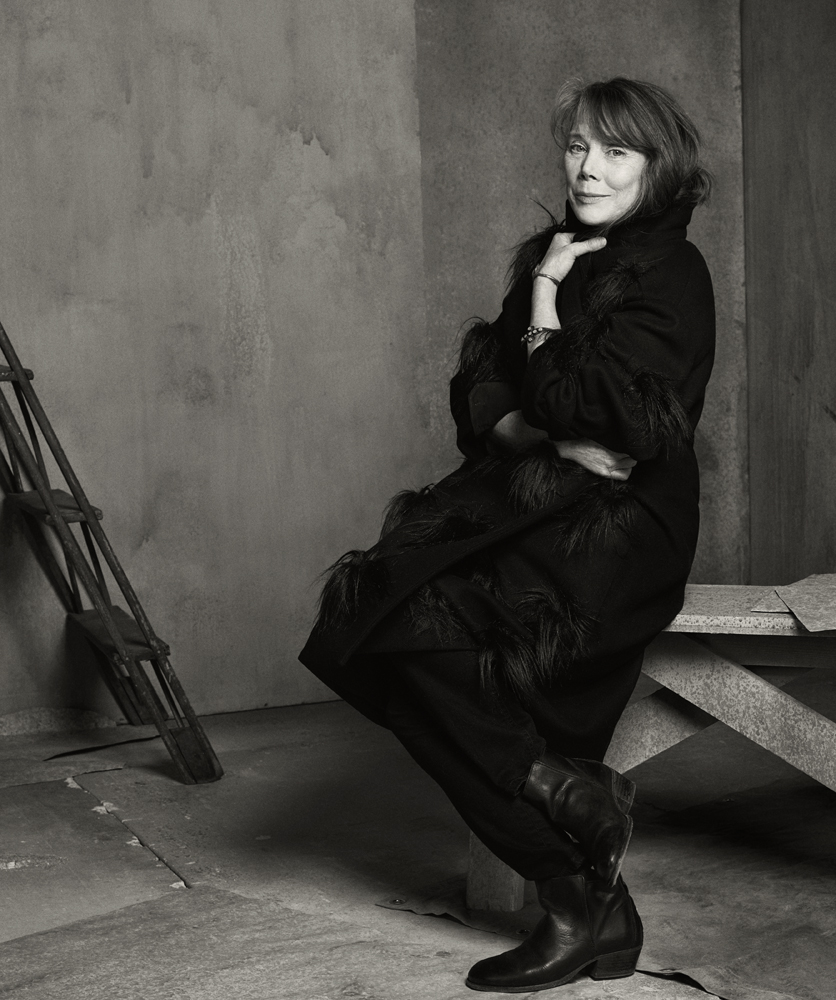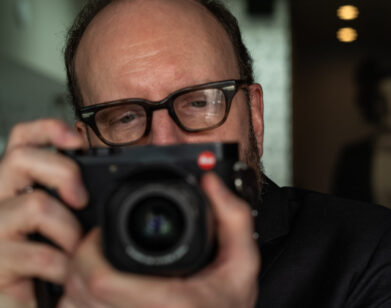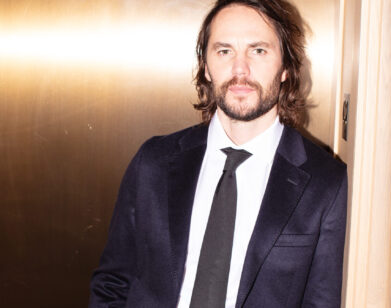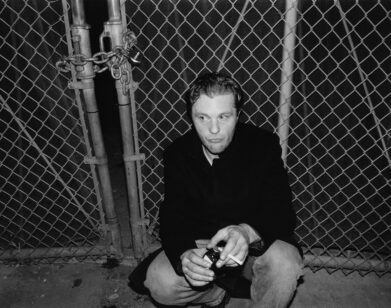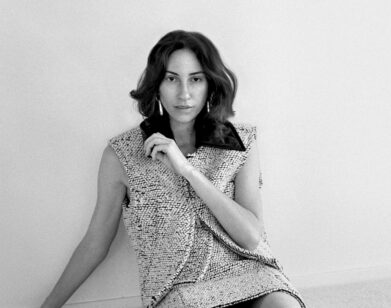Sissy Spacek
I remember thinking, ‘I am too well-adjusted for this acting thing.’ SISSY SPACEK
“It hit me that I was just this little girl born in Texas,” Sissy Spacek says in her great breakout performance, playing Holly Sargis, in Terrence Malick’s 1973 masterpiece Badlands. “For days afterward I lived in dread. Sometimes I wished I could fall asleep and be taken off to some magical land, and this never happened.”
Early in her career, Spacek was often cast as innocence incarnate, the all-American everygirl whose eventual and inevitable turn to violence or crime felt painfully close to home for the rest of us. In Malick’s tone poem of a road movie, Spacek’s straw straight hair, field of freckles, and saucer-size blue eyes made her Holly look vulnerable to anything and everything, from the high prairie sunlight to the wily charms of Martin Sheen’s mysterious drifter, Kit. But the restlessness Spacek gave Holly, and the moth-to-flame abandon with which she took up with Kit is as romantic as it is unnerving. The couple’s flight into beatnik Bonnie and Clyde-dom becomes a melancholy love story reflecting our own wildness and latent renegade-ism at the very crest of the hippie tide.
A few years later, in Brian De Palma’s adaptation of the Stephen King novel Carrie (1976), Spacek played the titular character as a cotton-soft high-schooler who can absorb all the torment and horror her classmates can offer, until she can absorb it no longer-and manifests telekinetic abilities to affect her revenge. The bloody prom scene, in which Spacek’s Carrie lays waste to the school auditorium and everyone in it, is among the most famous in film history. But nowhere is Spacek’s corrupted innocence better demonstrated than in her performance as Pinky Rose in Robert Altman’s 1977 film 3 Women, alongside Shelley Duvall and Janice Rule. After a failed suicide attempt, the formerly fearful and frantic Pinky begins to take on the vice and behaviors of her roommate (Duvall) to increasingly marvelous, if harrowing, effect.
Then, in 1980, Mary Elizabeth Spacek, who’d always been called Sissy since she was just this little girl born in Texas, where she grew up wanting to be a musician, played the country-western great Loretta Lynn in Coal Miner’s Daughter, and things changed. Spacek won an Oscar for her performance (and a Grammy nomination for work on the soundtrack), and she crossed over an invisible threshold. After playing tragic Juliets and America’s woebegone daughter, she become our collective wife (in movies like Costa-Gavras’s 1982 political thriller Missing and Oliver Stone’s JFK) and mother (in Todd Field’s 2002 drama In the Bedroom).
All told, Spacek has stacked up six Oscar nominations en route to becoming one of the greatest performers in American cinema. It happened. She’s spent her life in that magical land, showing the rest of us the way there.
As she prepares for the release of Netflix’s new series Bloodline, in which she plays, fittingly, the matriarch of a troubled family, across from Sam Shepard, Spacek spoke with Field about finding the devil in the details and dresser drawers, and some of the friends she’s made along the way.
TODD FIELD: Some time ago I was asked to speak at a film festival honoring you, and to prepare, I went back and reviewed your work—everything, all of it—something I had thankfully never done before we worked together. I was dumbstruck by the audacity of your performances and the sheer scope and breadth of them. Over the past 45 years your work has penetrated the consciousness of multiple generations of filmgoers in unbelievably powerful ways. My parents literally watched you grow up before their eyes. I first saw you in Coal Miner’s Daughter, and my children first saw you as Rose in David Lynch’s The Straight Story (1999). Consequently there are millions of people out there, people of all ages, with an endless amount of questions for you, questions about your many accomplishments and collaborators. My first question stems from something you once said when you characterized me as a certain breed of canine. And so I’m wondering, if Sissy Spacek is a dog, what kind of dog is she and why?
SISSY SPACEK: Oh, I’m a miniature dachshund. [laughs] I’m not very big. But I’ve got a big bark and a lot of heart.
FIELD: I agree with all those three things. [laughs] You and my wife, Serena Rathbun, collaborated on your character for In the Bedroom. Any anxiety I may have had about you two taking that on quickly evaporated when you told me how you liked to work—specifically about how that process began the moment you first walked in to Holly’s bedroom on Terry Malick’s Badlands and opened the dresser drawers. What you discovered there introduced you to not only a lifelong process as an actor, but also to your husband, the genius production designer Jack Fisk. What was in those drawers?
SPACEK: There was a little plaster of Paris horned toad, which is a Texas pet for most young children, which I still have, actually. And there was a little three-legged lead horse and rider, and various sundry trinkets: a little butterfly door-knocker, some silk scarves, and pencils. There was a set of jacks and a ball. Some books. I had never been on a set that was dressed with such detail. It was like Stanislavski art design.
FIELD: He was working from the inside out.
SPACEK: I learned so much about acting from that experience, and from working with Jack.
FIELD: That’s beautiful.
SPACEK: What kind of dog would you be?
FIELD: I know what kind of dog you said I was, but I’m not going to repeat it on this interview. [laughs]
SPACEK: Did I say a little bulldog?
FIELD: Kind of. It was more like a terrier.
SPACEK: A little Jack Russell! I think you have to be. You have to have tenacity to survive in this industry. Don’t you think?
FIELD: You do. And you’ve got to be able to get back up. It’s amazing if you do. I think small dogs fare well.
SPACEK: And they live a long time.
FIELD: And they can hide in the tall grass, too.
SPACEK: Your wife, Serena, did an amazing job on the sets [of In the Bedroom]. All I really did was go around to the antique stores and ask them if we could borrow some things. And then Serena would sweep in and pick out the right stuff.
FIELD: A lady of many talents.
SPACEK: I remember you sent things from your home: these beautiful paintings, all the beautiful linen sheets. I want you to know that because of my experience with you and Serena on that film, and the linen sheets that you brought in for the beds there, I now have linen sheets. I had the opportunity to screen that film again a couple of months ago and, oh my God, does it hold up. Beautiful. I just love it so much, Todd.
FIELD: I don’t know how I would feel looking at it now. I’ve never gone back to look at it. I was on a plane the other day with one of the kids and it came up on a screen, the beginning of it, and I swear, I watched it for 30 seconds and went, “Wow, that’s an interesting image.” [laughs] I had no idea it was the film. Okay. We have to stop talking about that film. My job as the interviewer is …
SPACEK: You’re failing at your job.
FIELD: No, you’re digressing, you’re helping me digress. Six times you’ve been nominated for best actress. You’ve also won for your portrayal of Loretta Lynn in Michael Apted’s Coal Miner’s Daughter. The late film critic Roger Ebert credited the film’s success “to the performance by Sissy Spacek as Loretta Lynn. With the same sort of magical chemistry she’s shown before, when she played the high school kid in Carrie, Spacek at 29 has the ability to appear to be almost any age on screen. Here she ages from about 14 to somewhere in her thirties, always looks the age, and never seems to be wearing makeup.” You did all your own singing; you were nominated for a Grammy. And you followed it up with your own country album, Hangin’ Up My Heart, with the hit single “Lonely but Only for You,” which reached No. 15 on the Billboard country chart. Like me, I’m guessing a lot of readers of Interview never knew your performing career began as a singer in 1967, when you moved from Quitman, Texas, to New York City. And I’m guessing that must have been quite a bit of culture shock for you. What kind of venues did you sing in, and how long was it before you decided to change gears and pursue acting instead?
SPACEK: For a while I just sang at a steakhouse. I would go from table to table, and really just survived on tips. Then when they had open-mic nights—I think at the time they called them hootenanny nights—I sang at places like the Bitter End in the Village. I think, at that time, I lived uptown, around Barnard College, but I would put on my moccasins and my bell bottoms and get my guitar and take the bus all the way down to Washington Square Park, take my guitar out and play music while all the guys played pinochle.
FIELD: Had you already been performing in Texas before you came up there?
SPACEK: Oh, yeah. Music is my thing. In fact, that’s what I wanted to do. I thought of myself as a musician. I had never thought about acting. I had cousins who were renowned and very, very gifted actors, and I didn’t want to embarrass them by trying that card. I actually never got in a play in school. My teacher said I never learned my lines. I think it went a little deeper than that. [laughs] I did a lot of background vocals. I sang in different groups. I worked with a lot of wonderful musicians, but that door didn’t open for me, really. But it was because of my fearlessness at the time, I think—I would perform at the drop of a hat with my guitars—that opened the doors for me with acting. Maybe it made people remember me when I would go in and read for something, and then pull out my guitar and go, “Oh, by the way, how ’bout I sing you a song?”
FIELD: But you made a decision to go with acting. Was that decision influenced by who you were living with at the time?
SPACEK: Well, I was just trying everything. I even tried to model. I’m just 5’2″. Now, had I any sense or guidance at the time, I would have known …
FIELD: Well, children’s catalogs.
SPACEK: [laughs] Exactly. I was trying everything, but my primary goal was to be a musician, singer-songwriter. But then I met a really wonderful manager who did all kinds of things, but primarily actors. He set me up for things. I studied for about six weeks, maybe six months. I’m not sure. I know I learned just about as much on my drive across 14th Street from the east side to the west side at night going to class as I did in class, because I didn’t stay there very long.
FIELD: You were in class with Lee Strasberg?
SPACEK: Well, I was at the Strasberg Institute. I went up in the elevator with him once, but I never was in a class with him. I’d never acted before. I was in what they called exercise class, learning what they called sense memory. And I remember thinking, “I am too well-adjusted for this acting thing,” because everybody was much better than I was. They seemed to know what they were doing. I was just a little wallflower. But, ironically enough, sense memory is the only thing I ever learned. I didn’t know how to use it, because I had never done a scene before, but that was the only thing I knew. I was like a one-trick pony. And it’s served me well over the years. I started working, and I thought, “What did I learn in acting class? Oh, sense memory!” So that was kind of the basis of my method, so to speak. My process. Whatever works.
FIELD: Andy Warhol started this magazine, and since you’re gracing these pages this month, I’d be remiss not to ask about your first film role, that of an extra at a bar in the Warhol Factory-produced Trash [1970], directed by Paul Morrissey. How on earth did you wind up on that film?
SPACEK: Well, I was working with these wonderful musicians. One, Kenny Laguna, was really a boy wonder. He was a fabulous musician, very plugged in, and he was doing the soundtrack for Lonesome Cowboys [1968], an Andy Warhol film. I was in an a cappella group with Kenny, and he asked me to sing on the soundtrack. It was actually a wonderful soundtrack, which I heard again five or six years ago. When we were in the studio, they said, “Oh, they’re shooting a scene with Holly Woodlawn over in a bar, and we need extras.” And we were like, “Oh, yes!” That was the hardest work I ever did, and then I ended up on the cutting room floor. I was just a girl in a bar. [laughs] Can we talk about Andy Warhol for a minute? The first time I did Interview magazine, I was very young, and a photographer named Ara Gallant photographed me. They crimped my hair; it was wild. But it was the most exciting time for me to get to meet Andy Warhol, and he brought me his book. Remember his book? What was the name of that? I have it somewhere here, and he signed it for me. It was so sweet. Me, my mom, and Andy Warhol at a photoshoot. It was just amazing.
FIELD: What year was that?
SPACEK: I’m not sure. In the late ’70s [May 1977 issue]. Andy interviewed me himself. And he was so gentlemanly and shy and sweet. And he was, of course, the epitome of cool and artistic talent and everything. I was just a little whippersnapper. I felt honored that the man himself showed up. And the first thing he said to me was, “Oh, you have such beautiful skin.” I never forgot that.
FIELD: Jack, Terry [Malick], and your former brother-in-law, David Lynch, were fellows of the American Film Institute, and you and Jack worked side by side building sets there. Is it true that you also invested some of your own money so David could finish making Eraserhead [1977].
SPACEK: We did. We always believed in David’s talent so much. He and Jack went to art school together, and they started making short films way back then. They kind of reminded me of those crazy, early movies the Beatles made, where they’re all running around in fast motion.
FIELD: Right. The Richard Lester films [Help!, 1965; A Hard Day’s Night, 1964]. They’re all under-cranked.
SPACEK: Yeah. And Jack was always the actor, because David was behind the camera. David has always been the consummate artist. He made Eraserhead over several years. We’d always joke and tease him. There was one scene were Jack Nance, who was the main character, walked through a door and came out the other side five years later because it took him so long. David would shoot until he ran out of money. He was just tireless. And Jack was doing B pictures for Roger Corman at the time. Maybe it was a little later than that, actually. But he would work during the week, get paid, cash the check, and turn it over to David. He was also the Man in the Planet, in Eraserhead. I served as script supervisor for one day. The hardest thing was sharing David with the rest of the world when he did The Elephant Man [1980]. It was like, “Okay, the cat’s out of the bag now; everybody knows. He doesn’t just belong to us anymore.” He used to live at AFI, and to go see him—he was in the stables, because he wasn’t supposed to be living there—you’d have to find the hidden key then unlock the door on the outside. That could have been a real dangerous thing.
FIELD: Wasn’t that at Greystone Mansion?
SPACEK: It was a mansion.
FIELD: Yeah, it was built by Doheny.
SPACEK: That’s the one. It was a fabulous place, but it wasn’t really a studio. I think AFI, years later, they got a studio with soundstages so filmmakers would have an easier time.
FIELD: They moved to Los Feliz; that’s where I went to AFI.
SPACEK: It’s funny that you all went there. That turned out some of our greatest filmmakers.
FIELD: It was a good place to go. So when you worked with David on The Straight Story, was that the first time you had worked together, quote-unquote professionally?
SPACEK: It was. I loved working on that. It really reminded me of the old days, because it was a low-budget film. Jack was working on that house, busting out walls. Suddenly David would appear—this is before they were shooting—and they were like two kids in art school tearing down a house. It was wonderful. It was not unlike the experience we had together on In the Bedroom. Everybody is there for the right reasons.
FIELD: Yeah, you try to take the industrial part out of it and keep the amateur part in it. So the scene partners you’ve had in your career read like a who’s—who in American cinema: Lee Marvin, Walter Matthau, Jack Lemmon, Robert Duvall, Bill Murray, Piper Laurie, Shelley Duvall, Geraldine Chaplin, Diane Keaton, and Jessica Lange, to name but a few. Like you, the above mentioned had long-storied careers. You’ve also worked with today’s younger set of actors, like Emma Stone and Jessica Chastain. If you were to give either of these two ladies one piece of advice, what would it be?
SPACEK: If I was to give Emma or Jessica advice? Listen, at this point I should be taking advice from them; they need no advice. They’re both incredible, and I would only say, “Stay true to yourself.” But they already are. They’re just awesome. I think as you get older, you don’t really get that much smarter, you just get more tired. [both laugh] What advice would you give them?
FIELD: Keep doing what you’re doing. They’re choosing really good roles and they’re doing really good work.
SPACEK: They also seem to be not taking it all too seriously. They’re certainly serious about their work, but they don’t take themselves so seriously. I love that.
FIELD: That’s huge.
SPACEK: I think people really do their best work when they’re just starting out.
FIELD: Well, there is a wonderful thing about not knowing certain things; about not being allergic to certain things yet—not having yet experienced the particular kinds of obstacles. So you just finished making Bloodline, a show that premieres on Netflix this month. In it, you play Sally Rayburn, the matriarch of a family that, from the looks of things, is concerned with their own creed and traditions, even at the expense of certain individual members. Is that an accurate description?
SPACEK: I like it. I may use it myself when asked about it. She’s the matriarch of this family and she’s just doing the best she can. They run an inn. Like most families, things that have happened in the past …
FIELD: Come back to roost.
SPACEK: Exactly. Being a parent is a really difficult thing, especially with grown children. When I was working on this, I kept thinking no good deed goes unpunished; no matter what we do, no matter how hard we work to raise our children, we mess them up. You can think you’re the best parent in the world, but you ask any kid about their parents, and they’ll tell you all the good things, but they’ll also tell you all the terrible things that they unknowingly did. The road to hell is paved with good intentions. That would be Sally Rayburn. I’m playing a woman with three grown sons and a grown daughter, and they’re in their thirties and forties. I’m like, “That would be me. [laughs] I gave birth to that group of giant people over there.”
FIELD: Does Sam Shepard play your husband?
SPACEK: Sam Shepard plays my husband, which was so fantastic because we’ve known each other for so long, and we’re such dear friends. We have so much history together. One day, we were doing a scene and Sam wanted to take out a line. I was like, “No, Sam, you can’t take out that line, because then my next line just doesn’t work.” And we were fussing. I just insisted that he do it, and he said, “Okay, Sissy. I’ll do it.” And we did the scene and I turned to everybody in the crew and went, “Oh God, I just argued about a line with the great American playwright.” And I won, only because he’s a gentleman. [laughs]
FIELD: Have you ever spent that much time in Florida, where the show was filmed?
SPACEK: No! I’m a freckled-face redhead. Are you kidding?
TODD FIELD IS THE DIRECTOR OF THE FILMS IN THE BEDROOM AND LITTLE CHILDREN.

